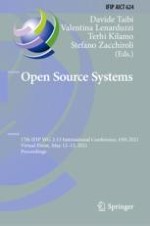This book constitutes the refereed proceedings of the 17th IFIP WG 2.13 International Conference on Open Source Systems, OSS 2021, held virtually in May 2021.
The 4 full papers and 3 short papers presented were carefully reviewed and selected from 23 submissions. The papers cover a wide range of topics in the field of free/libre open source software (FLOSS) and discuss theories, practices, experiences, and tools on development and applications of OSS systems, with a specific focus on two aspects:(a) the development of open source systems and the underlying technical, social, and economic issue, (b) the adoption of OSS solutions and the implications of such adoption both in the public and in the private sector.
